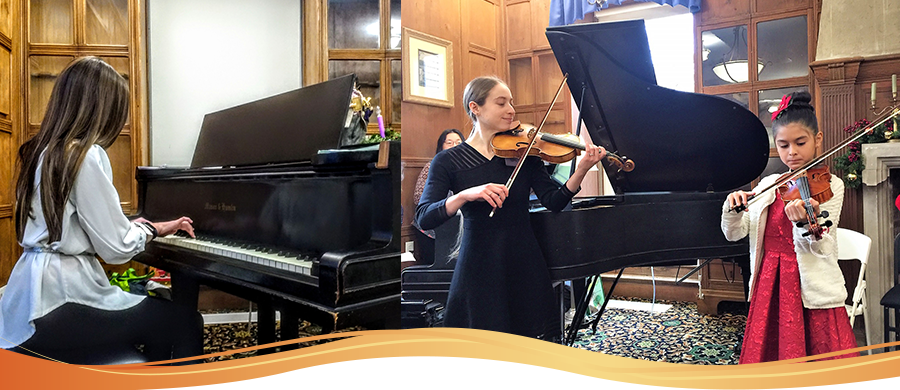
Online
Music for the Community
If you're interested in a particular category, you can sort performances by student age, instrument, singalong music, composer and so on - click on the orange tags under the text. We hope you and your family will enjoy watching our students share their music!
To have each week's videos and accompanying info sent to your inbox*, please subscribe via the orange button.
*Videos are delivered twice weekly; you can unsubscribe at any time, and we will never share or sell your info.
Subscribe to this Page
Displaying items by tag: Violin
Day 14: Marching Band
Violinist age 10 plays "Marching Band" by Edwards Huws Jones
This one’s good for both marching and singing! The song has three parts, and the first and last parts are for singing along. In the middle, you can hear the band very quietly at first, as if from far away. Then they round a corner and get louder, until finally they’re right in front of you again for another rousing chorus. Grab your shakers, saucepan lids and whatever else you have to hand, and make a parade all around the house!
Mar-ching, we're mar-ching, the bugles blow, it's time to go, we're
Mar-ching, we're mar-ching, the trumpets play, we're on our way!
[Quietly] Left two three four, left two three four, left right, left right, left right, left right
[Louder] Left two three four, left two three four, left right, left right, left right, LEFT RIGHT -
Mar-ching, we're mar-ching, the bugles blow, it's time to go, we're
Mar-ching, we're mar-ching, the trumpets play, we're on our way!
Day 12: Schindler's List
Violinist age 14 plays Theme from “Schindler’s List”
Steven Spielberg’s movie “Schindler’s List”, about the German manufacturer Oskar Schindler who saved more than 1000 Jews from the Holocaust by employing them in his factories, won 7 Oscars including Best Picture for Spielberg and Best Score (Music) for composer John Williams.
We feature its theme in homage to today’s observance of Holocaust Memorial Day, and in solidarity with victims of oppression everywhere.
Day 11: Massachusetts Music (Twinkle Variation A)
Violinist age 4 plays Twinkle Variation A, Massachusetts Music
This is the first piece that the young musicians in our Suzuki Program learn. The rhythm “Massachusetts Music” is an easy one for beginners, as it uses very short bow strokes – but it’s also something that will reappear many times in much bigger pieces, including professional ones.
This little student started in our Wayland Recreation “Small Group Intro to Violin” class over the summer. Five months later, and she was ready to share her music with an audience. She gets extra brownie points for stopping to “build fingers” carefully when she moves to a new string. Skills built solidly in small steps like this will lead to ease and confidence at all levels of playing.
Day 10: Tango by Neil Mackay
Violinist age 10 plays “Tango” by Neil Mackay
More dance music today – this time from South America. The tango combines musical elements from African, Native American and European cultures, and started in the 1880s among communities alongside the Rio de la Plata (Silver River), which is the natural border between the countries of Argentina and Uruguay. It was originally a dance for the common people, popular in dockside cafes and nightclubs, but eventually spread to Europe and North America too. Listen for the “Pa-PAH—pa pum-pum” rhythm that happens throughout the piece.
Day 8: Song of the Wind
Violinist age 10 plays Song of the Wind
Here’s another singalong song! (For the last one, see April 9th.)
Who has seen the wind, I wonder?
No-one that I know!
No-one that I know!
When the leaves are / flut-ter-ing the /
Wind is there but/ can’t be seen –
When the leaves are / flut-ter-ing the /
Wind is there I/ know.___(Repeat)
Day 5: Air Varie #5 by Dancla
Violinist age 12 plays Air Varie #5 by Dancla – Variations on a Theme by Weigel
Charles Dancla was a French violinist, composer and teacher. His skills were so impressive as a young child that he began studying at the Paris Conservatoire when he was only 9, and he later became a professor of violin there. He wrote six “Air Varies” for violin students, and they all start with a theme (here, a song that he borrowed from another composer), followed by a set of variations (fancy rewrites based on that theme). The variations are designed to showcase different aspects of violin technique, so these pieces are for more advanced students.
You’ll hear the theme first. Then listen out for:
- A fast, flowing variation to show fast left hand work
- A fiery “show-off” variation with technical challenges in the form of fancy bowings, and big chords for the left hand
- A slow, singing variation - in which the violinist is accompanying herself by plucking with her left hand, at the same time as using that hand and her bow to play sustained notes
- A fast, short ending section called a coda – which literally means tail – to wrap things up with a flourish
Day 4: O Come, Little Children
Violinist age 7 plays “O Come, Little Children”
This pretty folk song (which is actually a French Christmas carol) is one of the early pieces featured in the Suzuki violin program. This young violinist started out in our Wayland Recreation “Small Group Intro to Violin” class - and that’s his mom playing piano for him!
We give the kids singalong words to help them hear the music in their heads as they learn new songs on their instruments. The words we made up to this one are below, so you can sing along too. The first phrase in each verse repeats because the music does also - listen and sing again, to see if you can hear that happening. You could also make up a third verse with whatever instruments you have at home!
Verse 1
O come, little children, and play all your songs! O come, little children, and play all your songs!
Play violin, viola*, and cello and more – we’ll play round the town, then come back and play more!
[sing: vee-oh-la – stretch it to three syllables]
Verse 2
O come, little children, and play all your songs! O come, little children, and play all your songs!
Play flute, drums and trumpet, and piano, and more - we’ll play round the town, then come back and play more!
Day 1: "Musette" by Bach
Violinist age 9 plays "Musette" by Bach
Johann Sebastian Bach lived from 1685 to 1750. He was born in what is now Germany, was the youngest of 8 children, and had a thorough musical education from his father, uncles and older brother.
He was a very hardworking musician who lived and worked at the courts of various dukes and princes, where he had to produce new music on a weekly basis for courtly events and chapel services. Not surprisingly, his published works number well over 1000, and it's thought that there were many more which have been lost over time.
His main performing instrument was the organ, but he wrote pieces for many other instruments, including voice. He wrote this Musette originally for harpsichord, a forerunner of the modern-day piano. A "Musette" was actually a kind of bagpipe popular at the time, and Bach was trying to imitate one here - if you listen carefully to the piano accompanying the violin, you may be able to hear the held bass note or "pedal tone", just as you would with a bagpipe.


